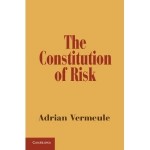 I comment at The New Republic on allegations that President Obama is acting like a monarch. Incidentally, I thought the debate about whether George W. Bush was Hitler or merely Caesar or perhaps Napoleon was also phony, so maybe I lack credibility.
I comment at The New Republic on allegations that President Obama is acting like a monarch. Incidentally, I thought the debate about whether George W. Bush was Hitler or merely Caesar or perhaps Napoleon was also phony, so maybe I lack credibility.
Category Archives: CONSTITUTIONAL LAW
Make journalists testify
As I argue in Slate.
Adrian Vermeule on The Constitution of Risk
 Adrian Vermeule’s new book, The Constitution of Risk, argues that much constitutional thinking follows a model of “precautionary constitutionalism,” where doctrines are designed to avoid worst-case outcomes. A better approach is what he calls “optimizing constitutionalism,” where such “political risks” are traded off rather than minimized. The Court of Appeals in Noel Canning, for example, appeared to be driven by a fear that if it upheld President Obama’s recess appointments, then presidents could tyrannize by avoiding the Senate altogether. It ignored the countervailing risk that if the recess appointment is limited, important offices would go unfilled. As Cass Sunstein has written in the area of regulation, the precautionary principle makes little sense on its own terms since there are always risks on all sides, and leads to pretty unattractive outcomes even when it can be applied. It’s as if we should all stay in our basements rather than take the risk that flower pot will fall on our heads if we go outside.
Adrian Vermeule’s new book, The Constitution of Risk, argues that much constitutional thinking follows a model of “precautionary constitutionalism,” where doctrines are designed to avoid worst-case outcomes. A better approach is what he calls “optimizing constitutionalism,” where such “political risks” are traded off rather than minimized. The Court of Appeals in Noel Canning, for example, appeared to be driven by a fear that if it upheld President Obama’s recess appointments, then presidents could tyrannize by avoiding the Senate altogether. It ignored the countervailing risk that if the recess appointment is limited, important offices would go unfilled. As Cass Sunstein has written in the area of regulation, the precautionary principle makes little sense on its own terms since there are always risks on all sides, and leads to pretty unattractive outcomes even when it can be applied. It’s as if we should all stay in our basements rather than take the risk that flower pot will fall on our heads if we go outside.
Among the many excellent insights, the one I found most striking was the claim that much traditional constitutional thinking and doctrine has a precautionary-principle cast to it, and is thus vulnerable to the same criticisms as that principle is.
Noel Canning to be argued today
Here is my Slate piece criticizing the originalist argument for ruling that President Obama violated the recess appointments clause. A while back I criticized the “the” argument. (Slate used the genius-level headline “Indefinite Articles”). Will Baude co-authored an interesting amicus brief that makes the originalist case for affirming and further argues that if you’re not an originalist, you should defer to the Senate’s right to define what a session is, so either way the president loses.
Inside or outside the system?
Suppose you agree with Madison’s theory that the government should be divided into three branches so that the ambition of each counteracts the ambition of the others. Now a case like Noel Canning arises, in which the executive clashes with the legislature. You ask the Supreme Court to resolve the dispute by enforcing the original understanding of the Constitution, tradition, or whatever other relevant factor under your favorite constitutional theory. Is your prescription consistent with your diagnosis of the problem? Can a (by hypothesis) ambitious judicial branch be expected to resolve a dispute fairly between the other two branches? Wouldn’t it instead resolve the dispute in a manner that maximizes its own power? In which case, why should you bother to argue that it should do otherwise?
These questions are the topic of a new paper I wrote with Adrian Vermeule, just published in the University of Chicago Law Review.
The NSA’s metadata program is constitutional
Or so I argue in Slate. Moreover, I believe that advances in Internet communications, data storage, data analysis, search, video surveillance, drones, and sensor technology will eventually render obsolete legal and constitutional privacy protections as they are currently understood. That, in the long run, the “assumption of risk” fiction of Smith will expand, not (as everyone believes) contract. That people will voluntarily give up information to the government in return for security against crime and foreign threats, in the same way that they give up information to Google in return for marginally better search results. That they will not think of themselves as compromising their independence or privacy, just as no one (aside from a tiny minority of privacy advocates) who uses Google really thinks of himself as giving up his independence or privacy. That the resulting society will not resemble 1984 in any meaningful sense (though it may resemble a Philip Dick novel).